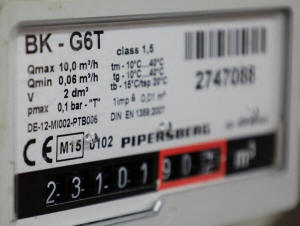Exclusive-Europeans dial down the heating, heed calls to save energy
 Send a link to a friend
Send a link to a friend
 [January 18, 2023] By
Thomas Escritt [January 18, 2023] By
Thomas Escritt
BERLIN (Reuters) - Europeans have dialled down their heating this
winter, apparently heeding government calls to conserve energy amid the
Ukraine crisis, with some delaying switching it on by almost a month and
setting the temperature lower, data shows.
The data, from hundreds of thousands of smart thermometers installed in
households across the continent by Munich-based company Tado, shows that
as temperatures dropped, households responded to dire warnings about
higher heating costs.
People and businesses across Europe are increasing their use of such
smart thermometers to keep an eye on how much gas they are using. These
are sometimes linked to an energy provider's tariff structure to smooth
demand and reduce peak costs. Germany has made them obligatory in
newbuilds.
In the winter of 2021-22, the proportion of homes with heating switched
on across Europe passed 90% on November 28. In the previous three years,
that threshold was passed weeks earlier, on November 7, 12, and 5
respectively, according to data from Tado, which is one of many
companies active in the fast growing smart thermometer market.

German public authorities reduced temperatures in their offices to a
chilly 19 degrees. At the university in Frankfurt an der Oder on the
Polish border, staff were issued with blankets to wrap themselves in.
Tado's data shows how households also cut back.
Home heating settings averaged almost a degree lower this winter than in
previous years, based on the data.
After a hectic time, energy regulators are more relaxed about Europe's
gas supply prospects.
"With savings, gas inflows, good storage levels, we are very, very
optimistic that we will no longer have to worry about a gas shortage
this winter," German network regulator Klaus Mueller said on Tuesday,
after previously having told consumers to make deep cuts to prevent
serious disruption.
The European Union imports 80% of its gas and gas represents 22% of
Europe's energy consumption and meets 32% of households' energy needs,
according to the EU.
But there have been huge efforts to reduce reliance on Russian gas and
increase imports from European gas producers like Norway and the
Netherlands, while Germany has quickly built LNG terminals.
Gas prices in Europe have fallen sharply from a peak in August, as a
rush to fill storage pushed the market higher.
[to top of second column] |

A gas meter is pictured in a private
home in Bad Honnef near Bonn, Germany, March 30, 2022.
REUTERS/Wolfgang Rattay

DUTCH STOICISM
Tado's data, based on readings from 340,000 cloud-linked smart
thermometers around Europe, is relatively resistant to varied
weather conditions over the four winters it measured, since it
records the target temperatures households set.
These show regional variations but also a clear direction. Dutch
households reduced target temperatures by 0.99 degrees Celsius on
average compared with a year ago, while Spanish consumers cut
targets by 0.29 degrees.
In Britain, 79.6% of Tado-linked homes lowered their temperature
settings, while in gas-rich Norway only 47% did. Temperature
settings in Norway dropped by 0.2 degrees Celsius to 20.8 degrees
and in Britain by 1 degree to 18.3 degrees.
European governments, including Germany, have provided billions of
euros to help people and businesses cope with the high energy bills.
Tado has three million thermometers installed, but comparisons can
only be made between thermostats that have been installed in the
same place for four years running. As a result, only about 10% of
them can be used in the data.
There is also a "wealth effect". In Western Europe the demographic
where the thermometers are installed is quite broad.
The data is less representative in countries in eastern Europe,
where households with smart thermostats tend to be the more wealthy
ones. In Bulgaria, Tado's customers lowered their temperatures by
0.28% on average.
"Some 79% of energy consumption in a private home is heating and hot
water," said Tado's Managing Director Christian Deilmann. "The TV,
cooking and lighting aren't so important: the important thing is to
have the heating and hot water under control."
German regulators are worried that the current lower gas prices will
make customers worry less about conserving energy. It is still too
early to tell from Tado's data whether households' energy discipline
is slackening.
"We have to start thinking about 2023/24," tweeted Mueller, the
German regulator, on Tuesday. "We have to keep saving gas, being
more energy efficient, build out renewables and fill storage."
(Reporting by Thomas Escritt. Editing by Jane Merriman)
[© 2023 Thomson Reuters. All rights
reserved.]
This material may not be published,
broadcast, rewritten or redistributed.
Thompson Reuters is solely responsible for this content. |